Introduction
In the construction industry, efficiency, versatility, and cost-effectiveness are crucial for the successful completion of projects. One piece of equipment that has gained significant popularity for meeting these requirements is the 2.5 ton mini excavator. This compact yet powerful machine offers numerous advantages, making it an essential tool on construction sites. In this article, we will explore the benefits of using a 2.5 ton mini excavator in construction, highlighting its features, applications, and overall impact on project outcomes.
Versatility of the 2.5 Ton Mini Excavator

Wide Range of Applications
The 2.5 ton mini excavator stands out for its impressive versatility, a trait that makes it an invaluable asset across various construction projects. One of the primary reasons for this versatility is its compact size, which allows it to maneuver easily in tight and confined spaces. This characteristic is particularly beneficial in urban construction environments where space is often limited and larger machinery cannot operate effectively.
The 2.5 ton mini excavator can perform a multitude of tasks, making it a multi-functional tool on the job site. Some of the common applications include digging trenches for utility lines, which is a frequent requirement in both new constructions and infrastructure maintenance projects. Its precision and control make it ideal for such delicate operations where accuracy is crucial.
In addition to trenching, the mini excavator excels in demolition tasks. Despite its small size, it is equipped with powerful hydraulic systems that enable it to break down structures efficiently. This makes it suitable for both minor demolition jobs, such as removing old sidewalks or small buildings, and for assisting in larger demolition projects by handling tasks that require more finesse.
Grading and leveling are other areas where the 2.5 ton mini excavator shines. Construction projects often require precise grading to ensure proper drainage and foundation stability. The mini excavator, with its ability to fine-tune the angle and depth of its bucket, provides the accuracy needed for these tasks, contributing to a solid and stable construction base.
Landscaping is another field where the 2.5 ton mini excavator proves its worth. From digging holes for planting trees to creating intricate garden layouts, the mini excavator can handle various landscaping tasks with ease. Its ability to switch between different attachments, such as augers for digging holes and grapples for moving rocks and debris, enhances its functionality in landscaping projects.
Efficiency and Productivity
Efficiency and productivity are critical metrics in the construction industry, and the 2.5 ton mini excavator is designed to excel in these areas. Equipped with advanced hydraulic systems, these machines offer smooth and precise operations that boost overall job site productivity. The powerful engines provide ample power to handle tough tasks, ensuring that projects are completed on time and within budget.
One of the significant advantages of the 2.5 ton mini excavator is its reduced need for frequent repositioning. Due to its compact design, the excavator can easily navigate around obstacles and within confined spaces without the need for constant adjustments. This translates to less downtime and more continuous work, enhancing overall efficiency on the job site.
The mini excavator’s design also focuses on operator comfort and ease of use. Ergonomically designed controls and comfortable cabins reduce operator fatigue, allowing for longer working hours without compromising on performance. Additionally, the intuitive control systems enable even less experienced operators to handle the machine effectively, further boosting productivity.
Another aspect of efficiency is the mini excavator’s ability to quickly switch between various attachments. This feature significantly reduces the time spent on changing tools, allowing the machine to move seamlessly from one task to another. Whether it’s switching from a digging bucket to a hydraulic breaker or from an auger to a grapple, the ease of attachment changes ensures minimal downtime and maximized operational efficiency.
Furthermore, the 2.5 ton mini excavator’s small footprint means it causes less disruption to the surrounding environment. In urban settings, this is particularly advantageous as it minimizes traffic interruptions and reduces the impact on nearby businesses and residents. The ability to perform efficiently in such settings without causing significant disruptions is a testament to the machine’s design and functionality.
Cost-Effectiveness
Lower Operating Costs
One of the standout benefits of the 2.5 ton mini excavator is its cost-effectiveness, particularly regarding operating costs. Unlike larger excavators that require significant amounts of fuel, the 2.5 ton mini excavator operates on a much smaller fuel consumption rate. This reduction in fuel usage translates directly into cost savings for construction companies, especially on long-term projects where fuel expenses can accumulate significantly.
In addition to fuel efficiency, the maintenance costs for a 2.5 ton mini excavator are notably lower compared to larger machinery. The smaller size of the mini excavator means fewer complex parts, which in turn leads to fewer breakdowns and repairs. Routine maintenance, such as oil changes and part replacements, is simpler and less expensive, further reducing the overall cost of ownership.
The initial purchase price of a 2.5 ton mini excavator is also significantly lower than that of larger machines. For construction companies, this lower upfront cost can free up capital to be invested in other critical areas of the business. Furthermore, the affordability of mini excavators makes them accessible to smaller contractors and independent operators, broadening their market reach and allowing them to compete more effectively.
Increased Return on Investment (ROI)
The cost-effectiveness of the 2.5 ton mini excavator extends beyond just lower operating costs; it also offers an increased return on investment (ROI). Due to their versatility, these machines can be utilized across a wide range of projects, ensuring they are constantly in use and not sitting idle. This continuous utilization maximizes the value extracted from the investment, providing a steady stream of revenue for construction companies.
The efficiency and productivity of the 2.5 ton mini excavator also contribute to a higher ROI. By completing tasks quickly and accurately, these machines help keep projects on schedule, reducing the risk of costly delays. The precision offered by mini excavators minimizes the need for rework, which can be both time-consuming and expensive. Every hour saved on the job site directly impacts the profitability of the project.
Moreover, the adaptability of the 2.5 ton mini excavator allows it to handle a variety of tasks without the need for multiple specialized machines. This multi-functionality means that one mini excavator can replace several pieces of equipment, reducing the overall equipment investment needed for a project. For example, a mini excavator equipped with interchangeable attachments can perform digging, trenching, grading, and demolition tasks, all with one machine. This versatility not only saves on equipment costs but also reduces the logistical burden of transporting and maintaining multiple machines.
The longevity of the 2.5 ton mini excavator also plays a crucial role in enhancing ROI. These machines are built to last, with durable construction and reliable components that ensure long-term performance. With proper maintenance, a 2.5 ton mini excavator can provide many years of service, further extending the period over which the initial investment is recouped.
Additionally, the resale value of a well-maintained 2.5 ton mini excavator remains high. The demand for used mini excavators is robust, as they offer an affordable entry point for smaller contractors and businesses. When it comes time to upgrade or replace equipment, owners can often recover a significant portion of their investment by selling their used mini excavator, thereby further boosting the overall ROI.
Case Study: Cost Savings in Urban Construction
To illustrate the cost-effectiveness of the 2.5 ton mini excavator, consider a case study involving an urban construction project. In a bustling city center, a construction company was tasked with renovating an old building, which required careful demolition and excavation work in a highly constrained space. The company opted to use a 2.5 ton mini excavator due to its compact size and maneuverability.
The project timeline was tight, and delays would incur substantial penalties. Thanks to the mini excavator’s efficiency, the company was able to complete the demolition phase ahead of schedule. The lower fuel consumption of the mini excavator resulted in significant savings on fuel costs, and the minimal maintenance required during the project further reduced expenses. Overall, the use of the 2.5 ton mini excavator allowed the company to complete the project within budget and ahead of schedule, demonstrating substantial cost savings and a high return on investment.
Comparison with Other Equipment
When compared to larger excavators and other construction equipment, the 2.5 ton mini excavator offers a clear cost advantage. Larger excavators, while powerful, come with higher fuel consumption, more complex maintenance requirements, and greater upfront costs. These factors can significantly increase the total cost of ownership. On the other hand, smaller equipment or manual labor may not provide the same level of efficiency and versatility as the mini excavator, leading to longer project timelines and potentially higher labor costs.
Environmental Benefits
Reduced Environmental Impact
The 2.5 ton mini excavator is designed with a strong focus on minimizing its environmental impact, which is increasingly important in today’s construction industry. One of the primary ways it achieves this is through its reduced emissions. Equipped with modern, fuel-efficient engines, the 2.5 ton mini excavator produces significantly lower levels of harmful exhaust gases compared to larger, more traditional machinery. This reduction in emissions helps to decrease the carbon footprint of construction projects, making them more environmentally sustainable.
Moreover, the smaller size of the 2.5 ton mini excavator means it consumes less fuel overall. This lower fuel consumption not only translates into cost savings for construction companies but also results in fewer greenhouse gases being released into the atmosphere. By choosing to use a 2.5 ton mini excavator, companies can contribute to global efforts to combat climate change by reducing their reliance on fossil fuels and minimizing their environmental impact.
In addition to lower emissions, the 2.5 ton mini excavator also has a smaller physical footprint on the job site. This means less disruption to the surrounding environment, whether it be urban landscapes or natural habitats. The compact nature of the machine allows it to operate in tight spaces without causing significant damage to the terrain or existing infrastructure. This is particularly important in projects that involve working near sensitive areas, such as wetlands, protected parks, or residential neighborhoods.
Noise Reduction
Noise pollution is a significant concern in many construction projects, especially those located in urban or residential areas. The 2.5 ton mini excavator is designed to operate more quietly than larger excavators, making it a suitable choice for projects where noise restrictions are in place. The quieter operation of the mini excavator is achieved through advanced engine technology and sound-dampening materials that reduce the overall noise levels generated during operation.
This reduction in noise pollution has several benefits. For one, it ensures compliance with local noise ordinances and regulations, which can be stringent in many urban settings. Meeting these requirements can prevent costly fines and project delays, ensuring that construction work proceeds smoothly.
Furthermore, lower noise levels enhance the quality of life for nearby residents and businesses. Construction noise can be disruptive and stressful, particularly in densely populated areas. By using a 2.5 ton mini excavator, construction companies can minimize this disruption, maintaining better relationships with the community and reducing complaints from those living or working near the construction site.
Energy Efficiency
Energy efficiency is another significant environmental benefit of the 2.5 ton mini excavator. These machines are equipped with state-of-the-art hydraulic systems and energy-efficient engines that maximize performance while minimizing energy use. The advanced hydraulic systems ensure that power is delivered precisely where and when it is needed, reducing wasted energy and improving overall efficiency.
Energy-efficient machinery like the 2.5 ton mini excavator helps reduce the consumption of natural resources, which is crucial for sustainable development. By using less fuel and operating more efficiently, these machines help conserve finite resources and reduce the environmental impact of construction activities.
Eco-Friendly Attachments and Practices
The 2.5 ton mini excavator also supports a variety of eco-friendly attachments and construction practices. For example, there are attachments specifically designed for tasks like soil stabilization, which can reduce erosion and improve soil health. By using these attachments, construction companies can implement more sustainable building practices that have long-term environmental benefits.
In addition, many mini excavators are now available with electric or hybrid engines. These models further reduce emissions and fuel consumption, making them an even more environmentally friendly option. Electric mini excavators produce zero emissions during operation, making them ideal for use in indoor or environmentally sensitive areas.
Sustainability in Construction
Sustainability in construction is about more than just using eco-friendly equipment; it also involves adopting practices that minimize environmental impact throughout the lifecycle of a project. The 2.5 ton mini excavator supports sustainable construction practices by enabling more precise and controlled excavation, which reduces waste and minimizes site disturbance.
For instance, the precision offered by the mini excavator allows for more accurate digging and placement of materials, reducing the amount of soil that needs to be moved and minimizing the disruption to the surrounding environment. This precision also means that less material is wasted, and fewer resources are needed to complete the project.
Furthermore, the compact size and versatility of the 2.5 ton mini excavator make it easier to transport to and from job sites, reducing the carbon footprint associated with moving heavy machinery. This is particularly important for projects that require frequent relocation of equipment, as the environmental impact of transportation can be significant.
Case Study: Green Construction Project
To highlight the environmental benefits of the 2.5 ton mini excavator, consider a green construction project aimed at building a sustainable community park. The project involved extensive landscaping, excavation, and installation of eco-friendly infrastructure. By using a 2.5 ton mini excavator, the construction company was able to minimize soil disruption, reduce emissions, and operate within the stringent noise limits set by the local community.
The mini excavator’s ability to operate efficiently in confined spaces allowed the team to work around existing trees and vegetation, preserving the natural habitat and maintaining the ecological balance of the area. The use of energy-efficient equipment and eco-friendly attachments further ensured that the project adhered to the highest standards of environmental sustainability.
Safety and Accessibility
Enhanced Safety Features
Safety is a paramount concern on any construction site, and the 2.5 ton mini excavator is designed with numerous features that prioritize operator and site safety. One of the primary safety enhancements is the inclusion of advanced stability systems. These systems ensure that the mini excavator remains stable even on uneven or sloped terrain, reducing the risk of tipping over. This is particularly important in urban construction sites where space is limited, and the ground may be less predictable.
The 2.5 ton mini excavator also comes equipped with ergonomic controls that are designed to reduce operator fatigue and improve precision. The controls are intuitive and easy to use, allowing operators to perform tasks with greater accuracy and less effort. This not only enhances productivity but also reduces the likelihood of accidents caused by operator error.
Improved visibility is another critical safety feature of the 2.5 ton mini excavator. The cab design offers a 360-degree view of the job site, allowing operators to see obstacles, workers, and other machinery clearly. This panoramic visibility is essential for preventing collisions and ensuring that operators can navigate the machine safely in tight spaces. Additionally, many models come with rearview cameras and proximity sensors that provide real-time feedback, further enhancing situational awareness.
Furthermore, the mini excavator is equipped with robust safety mechanisms such as emergency shut-off switches and automatic lockout features. These mechanisms ensure that the machine can be quickly and safely deactivated in case of an emergency. The presence of these features gives operators and site managers peace of mind, knowing that they can respond effectively to unforeseen situations.
Accessibility and Ease of Use
The 2.5 ton mini excavator is designed to be highly accessible and user-friendly, making it suitable for a wide range of operators, including those with less experience. One of the key aspects of its accessibility is the simplified control system. The controls are intuitive and straightforward, allowing new operators to quickly learn how to handle the machine. This ease of use reduces the training time required, enabling construction companies to get new hires up to speed quickly and efficiently.
The compact size of the 2.5 ton mini excavator also enhances its accessibility. Its smaller footprint allows it to operate in confined spaces where larger machinery cannot fit. This makes it ideal for urban construction projects, indoor demolition, and residential landscaping tasks. The ability to navigate narrow alleys, backyards, and indoor spaces without causing damage to surrounding structures is a significant advantage.
In addition to its physical accessibility, the mini excavator is also designed for operator comfort. The cabs are ergonomically designed with adjustable seats, climate control, and noise reduction features, ensuring a comfortable working environment. This focus on comfort allows operators to work for extended periods without experiencing fatigue, which can lead to improved productivity and reduced risk of accidents.
Another factor contributing to the ease of use is the machine’s advanced technology. Many 2.5 ton mini excavators are equipped with digital displays and automated systems that assist with precise operations. For example, grade control systems help operators achieve the correct slope and depth without manual measurements, while telematics systems provide real-time data on machine performance and maintenance needs. These technological advancements make operating the mini excavator simpler and more efficient.
Training and Certification
To further enhance safety and accessibility, manufacturers of the 2.5 ton mini excavator offer comprehensive training programs for operators. These programs cover the basics of machine operation, safety protocols, and maintenance procedures. By providing structured training, manufacturers ensure that operators are well-equipped to handle the mini excavator safely and effectively.
Certification programs are also available, allowing operators to demonstrate their proficiency and knowledge. Certified operators are better prepared to manage the machine’s capabilities and respond to any challenges that may arise on the job site. This level of preparedness contributes to a safer working environment and reduces the likelihood of accidents.
Case Study: Improved Safety on a Residential Project
Consider a residential construction project where safety and accessibility were critical concerns. The project involved excavating a narrow backyard to install a swimming pool. The confined space and proximity to the house required precise and careful operation.
The construction company chose a 2.5 ton mini excavator for the job due to its compact size and advanced safety features. The operator, who had undergone comprehensive training, was able to navigate the tight space with ease. The machine’s stability systems ensured that it remained balanced on the uneven ground, and the enhanced visibility allowed the operator to avoid obstacles and ensure the safety of workers on the site.
The project was completed efficiently and without any safety incidents, demonstrating the effectiveness of the 2.5 ton mini excavator in challenging environments. The company’s decision to invest in a mini excavator with robust safety features and provide thorough operator training paid off, resulting in a successful and safe project completion.
Regulatory Compliance
Regulatory compliance is another important aspect of safety in construction. The 2.5 ton mini excavator is designed to meet or exceed safety standards set by regulatory bodies. This includes compliance with emissions regulations, noise limits, and safety requirements. By using equipment that adheres to these standards, construction companies can avoid fines, legal issues, and project delays.
Comparison with Other Equipment
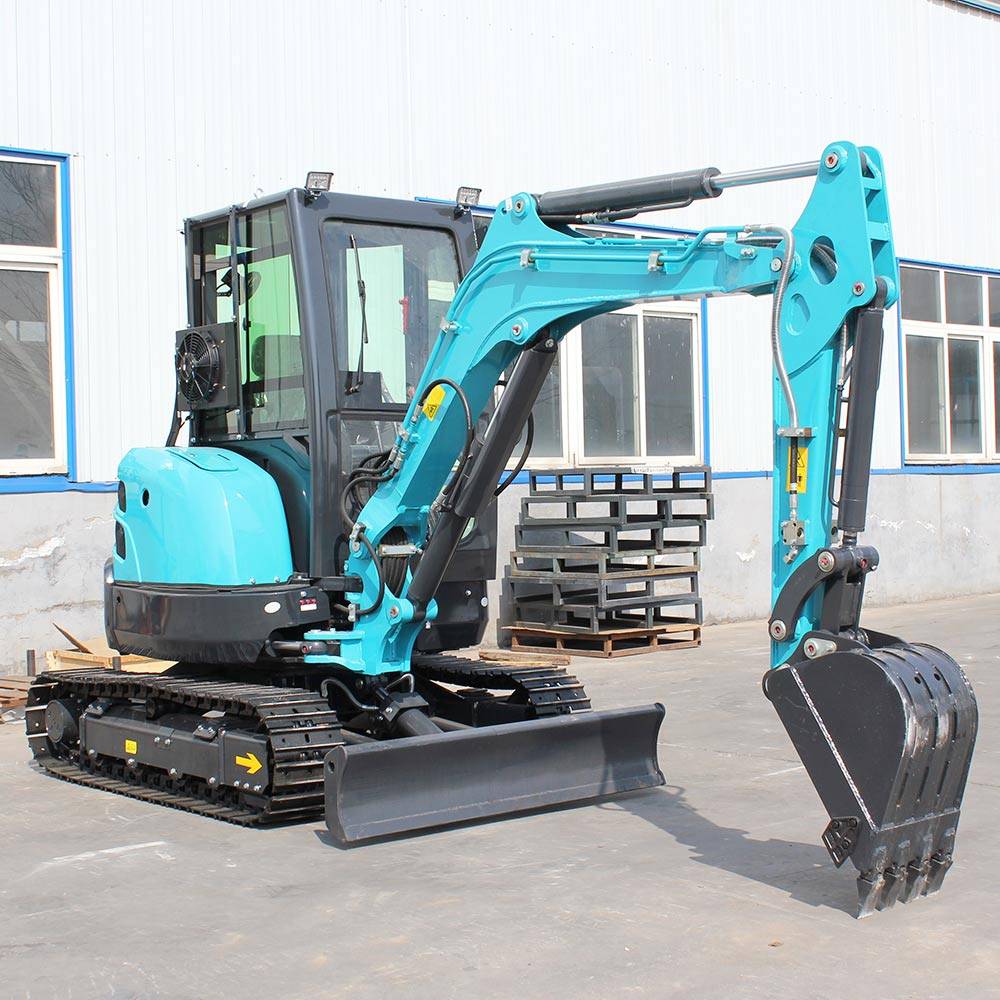
Comparison with Larger Excavators
When comparing the 2.5 ton mini excavator to larger excavators, several key differences highlight the unique advantages of the mini excavator. Larger excavators, while powerful and capable of handling substantial loads, often come with significant drawbacks in terms of cost, maneuverability, and environmental impact.
Firstly, the size and power of larger excavators make them suitable for heavy-duty tasks such as large-scale earthmoving and mining. However, this same size makes them less versatile in confined or urban spaces. Larger excavators require more space to operate, which can be a significant limitation in crowded construction sites or residential areas where space is at a premium. In contrast, the 2.5 ton mini excavator’s compact size allows it to maneuver easily in tight spaces, making it ideal for urban construction, landscaping, and smaller-scale projects.
Operating Costs and Efficiency
Operating costs are another major factor where the 2.5 ton mini excavator excels compared to its larger counterparts. Larger excavators consume more fuel due to their size and power requirements, leading to higher operational expenses. Additionally, the maintenance costs for larger excavators are generally higher due to the complexity and number of parts. In contrast, the 2.5 ton mini excavator is designed to be fuel-efficient and has lower maintenance costs, making it a more economical choice for many projects.
Efficiency is also a critical consideration. While larger excavators can move more material in a single pass, they often require more time to set up and reposition, especially in confined spaces. The mini excavator’s ability to operate continuously without frequent repositioning enhances overall productivity, especially on smaller job sites where precision and agility are more important than sheer power.
Environmental Impact
Environmental impact is another area where the 2.5 ton mini excavator has an advantage. Larger excavators typically produce higher emissions and consume more fuel, contributing to a larger carbon footprint. The 2.5 ton mini excavator, with its fuel-efficient engines and lower emissions, is a more environmentally friendly option. This makes it suitable for projects that prioritize sustainability and for use in areas with strict environmental regulations.
Comparison with Manual Labor
When compared to manual labor, the 2.5 ton mini excavator offers significant advantages in terms of efficiency, safety, and cost-effectiveness. Manual labor, while flexible and often necessary for detailed or delicate tasks, is labor-intensive and time-consuming. It also poses higher physical risks to workers, such as musculoskeletal injuries from repetitive tasks or heavy lifting.
Efficiency and Productivity
The 2.5 ton mini excavator dramatically increases efficiency and productivity on construction sites. Tasks that would take several workers hours or even days to complete can be finished in a fraction of the time with a mini excavator. For example, digging a trench by hand is a laborious process, whereas a mini excavator can accomplish this task quickly and with greater precision. This efficiency not only speeds up project timelines but also reduces labor costs, as fewer workers are needed for manual digging and other repetitive tasks.
Safety
Safety is a crucial consideration when comparing the mini excavator to manual labor. Operating a mini excavator reduces the physical strain on workers, as the machine handles the heavy lifting and digging. This minimizes the risk of injuries related to manual labor, such as back strain, repetitive motion injuries, and accidents from manual tool use. Furthermore, the enhanced safety features of the mini excavator, such as stability systems and ergonomic controls, contribute to a safer working environment overall.
Comparison with Other Small Equipment
The 2.5 ton mini excavator also stands out when compared to other small construction equipment, such as skid steers, backhoes, and compact loaders. While each of these machines has its own strengths, the mini excavator offers a unique combination of versatility, efficiency, and precision.
Versatility and Attachments
Skid steers and backhoes are versatile and widely used in construction, but the 2.5 ton mini excavator often offers superior versatility due to its wide range of compatible attachments. The ability to quickly switch between buckets, augers, breakers, and other attachments allows the mini excavator to perform a diverse set of tasks, from digging and trenching to demolition and material handling. This versatility makes it a highly adaptable tool on any job site, reducing the need for multiple machines.
Precision and Control
Precision and control are other areas where the 2.5 ton mini excavator excels. The advanced hydraulic systems and compact design provide operators with exceptional control over the machine’s movements, enabling precise digging and placement of materials. This level of control is particularly beneficial in projects that require fine detail work, such as landscaping or working around existing structures. Skid steers and backhoes, while powerful, often lack the same level of finesse, making the mini excavator the better choice for tasks that require precision.
Maneuverability and Accessibility
Maneuverability is another significant advantage of the 2.5 ton mini excavator. Its compact size allows it to navigate tight spaces and operate in confined areas where larger equipment cannot fit. This makes it ideal for urban construction, indoor projects, and residential work. Compact loaders and skid steers, while also designed for smaller spaces, do not offer the same range of motion and flexibility as the mini excavator’s articulated arm and boom.
Case Study: Versatility and Cost Savings
To illustrate the benefits of the 2.5 ton mini excavator in comparison to other equipment, consider a construction company working on a mixed-use development in a dense urban area. The project involved excavation, utility installation, and landscaping, all within confined spaces with limited access.
Case Studies and Real-World Examples
Urban Construction Projects
In urban construction projects, space constraints and tight schedules are common challenges that require innovative solutions. The 2.5 ton mini excavator has proven to be an invaluable tool in such environments. One notable example is a residential development project in a densely populated city where the construction company had to demolish an old building and prepare the site for new construction. The narrow streets and close proximity to other buildings made it impossible to use larger machinery.
The construction company chose the 2.5 ton mini excavator for its compact size and maneuverability. The mini excavator was able to navigate the narrow alleys and confined spaces with ease, performing demolition and excavation tasks efficiently. Its advanced hydraulic systems provided the power needed to break down the old structure while minimizing noise and vibration, which was crucial in a residential area.
The project also required precise digging for utility lines and foundations. The mini excavator’s precision and control allowed the operators to dig accurately without disturbing nearby structures or underground utilities. This level of precision reduced the risk of damage and ensured that the project stayed on schedule. The successful completion of the project highlighted the mini excavator’s ability to handle complex urban construction tasks with efficiency and minimal disruption.
Landscaping and Maintenance
The versatility of the 2.5 ton mini excavator extends to landscaping and maintenance projects, where its ability to perform a variety of tasks makes it an essential tool. In a recent park renovation project, the mini excavator played a key role in transforming the space into a modern recreational area. The project involved tasks such as digging new pathways, planting trees, and installing playground equipment.
The mini excavator’s ability to switch between different attachments made it ideal for the diverse requirements of the project. An auger attachment was used to dig holes for tree planting, ensuring that each tree was placed at the correct depth and spacing. A grading bucket attachment allowed for precise leveling of the pathways, creating smooth and even surfaces for walking and cycling.
The compact size of the mini excavator enabled it to operate without damaging the existing landscape or disturbing park visitors. Its quiet operation was particularly beneficial in maintaining a peaceful environment. The project was completed ahead of schedule, thanks to the efficiency and versatility of the mini excavator. The park renovation not only enhanced the community’s recreational space but also demonstrated the mini excavator’s capability in landscaping and maintenance projects.
Infrastructure Development
Infrastructure development projects often involve complex and large-scale tasks that require reliable and versatile machinery. The 2.5 ton mini excavator has proven its worth in such projects, as seen in a recent highway expansion project. The project involved widening an existing road and installing new drainage systems, which required precise excavation and trenching.
The mini excavator’s advanced hydraulic systems provided the necessary power to dig deep and narrow trenches for the drainage pipes. Its compact size allowed it to work alongside existing traffic without causing significant disruptions. The ability to operate in confined spaces was particularly important for maintaining safety and efficiency on the busy highway.
Additionally, the mini excavator was used to grade and level the expanded road sections. Its precision ensured that the new road surfaces were even and met the required specifications. The project also involved installing new signage and guardrails, tasks for which the mini excavator’s versatility was essential. The machine’s ability to quickly switch between attachments reduced downtime and improved overall productivity.
The highway expansion project was completed on time and within budget, showcasing the mini excavator’s effectiveness in infrastructure development. The use of the 2.5 ton mini excavator helped to minimize environmental impact, reduce costs, and ensure the safety of both workers and the public.
Agricultural Applications
Beyond construction, the 2.5 ton mini excavator has found applications in agriculture, where its versatility and efficiency are highly valued. In a recent vineyard development project, the mini excavator was used to prepare the land for planting grapevines. The project required careful excavation to create rows for the vines and install irrigation systems.
The mini excavator’s precision allowed for the accurate placement of irrigation lines, ensuring that each vine received adequate water. Its ability to operate in tight rows without damaging the soil structure was crucial for maintaining soil health and promoting optimal growth conditions for the vines. The machine’s versatility was also evident in its use for other tasks such as removing old vines, grading land, and maintaining access roads.
The vineyard project demonstrated the mini excavator’s adaptability to agricultural tasks, where precision and care are essential. The successful completion of the project highlighted the benefits of using the mini excavator in agriculture, including increased efficiency, reduced labor costs, and improved land management.
Environmental Conservation Projects
The 2.5 ton mini excavator has also played a significant role in environmental conservation projects. One such project involved the restoration of a wetland area that had been degraded by human activity. The goal was to restore the natural habitat for local wildlife and improve water quality.
The mini excavator was used to remove invasive plant species, dig new channels to improve water flow, and create ponds to support diverse aquatic life. Its compact size allowed it to work in sensitive areas without causing significant disruption to the existing ecosystem. The machine’s precision was essential for shaping the landscape in a way that mimicked natural processes.
The project also involved planting native vegetation to stabilize the soil and provide habitat for wildlife. The mini excavator’s ability to switch between different attachments made it easy to plant trees and shrubs accurately. The restoration project was a success, resulting in improved water quality, increased biodiversity, and enhanced habitat for local wildlife.
This case study highlighted the mini excavator’s suitability for environmental conservation projects, where minimal impact and precision are critical. The project demonstrated that the 2.5 ton mini excavator could effectively contribute to sustainable development and environmental restoration efforts.
Table: Comparison of Excavator Sizes
| Feature | 2.5 Ton Mini Excavator | 5 Ton Excavator | 10 Ton Excavator |
|---|---|---|---|
| Maneuverability | High | Medium | Low |
| Fuel Consumption | Low | Medium | High |
| Emissions | Low | Medium | High |
| Operating Costs | Low | Medium | High |
| Versatility | High | High | Medium |
| Noise Levels | Low | Medium | High |
| Suitable for Urban Projects | Yes | Yes | No |
| Transport Requirements | Minimal | Moderate | Significant |
Conclusion
The 2.5 ton mini excavator is a powerful and versatile tool that offers numerous benefits in construction. Its compact size, efficiency, cost-effectiveness, and environmental benefits make it an ideal choice for a wide range of projects. Whether working in urban environments, undertaking landscaping tasks, or seeking a budget-friendly option, the 2.5 ton mini excavator delivers exceptional performance and value.
FAQ
Q: What are the key advantages of using a 2.5 ton mini excavator?
A: The key advantages include its compact size, versatility, lower operating costs, reduced environmental impact, and enhanced safety features.
Q: Can a 2.5 ton mini excavator be used for large construction projects?
A: While it is best suited for smaller to medium-sized projects, the 2.5 ton mini excavator can complement larger machinery in extensive projects by handling tasks in confined spaces.
Q: How does the 2.5 ton mini excavator contribute to cost savings?
A: It offers lower fuel consumption, reduced maintenance costs, and the ability to complete tasks quickly, which reduces overall project costs.
Q: What types of attachments are available for the 2.5 ton mini excavator?
A: Common attachments include buckets, augers, breakers, and grapples, allowing the excavator to perform various tasks such as digging, drilling, demolition, and material handling.
Q: Is the 2.5 ton mini excavator environmentally friendly?
A: Yes, it produces lower emissions and consumes less fuel compared to larger machines, making it a more environmentally sustainable option.





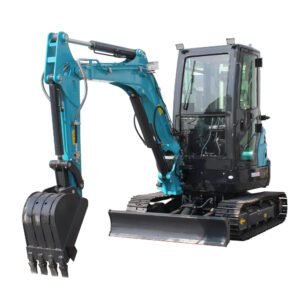
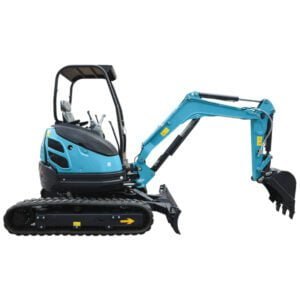
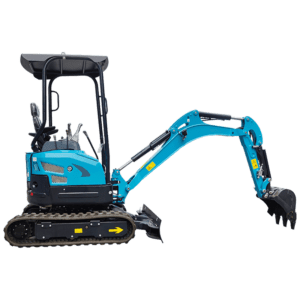

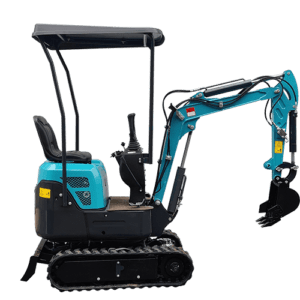

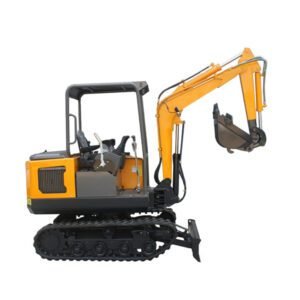

-1.png)